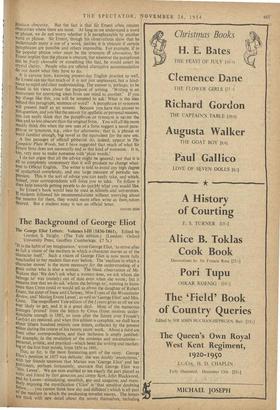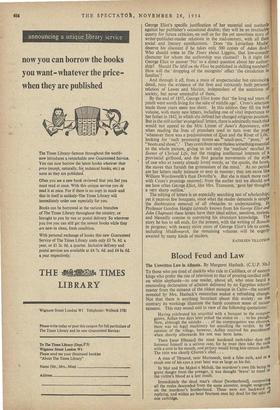The Background of George Eliot
'IT is the habit of my imagination,' wrote George Eliot, 'to strive after as full a vision of the medium in which a character moves as of the character itself.' Such a vision of George Eliot is now more fully vouchsafed to her readers than ever before. The 'medium in which a character moves' is the more necessary for the understanding of a great writer who is also a woman. The bleak observation of Mr. Wakem that `We don't ask what a woman does, we ask whom she belongs to' was (mainly) out of date even when she wrote; but it remains true that we do ask 'whom she belongs to' wanting to know More than Cross could or would tell us about the daughter of Robert Evans, the sister of Isaac and Chrissey, Miss Evans of the Westminster Review, and' Maria Evans Lewes', as well as 'George Eliot' and Mrs. Cross. The magnificent Yale edition of the Letters gives us all we are ever likely to get, and it is a great deal. Most of the numerous Passages 'pruned' from the letters by Cross (from motives under- standable enough in 1885, so soon after the furore over Froude's Carlyle) arc restored, and when this edition is complete, we shall have about fifteen hundred entirely new letters, collected by the present editor during the course of his twenty years' work. About a third are from other correspondents, and their inclusion is amply justified: for example, in the revelation of the anxieties and uncertainties— Personal, artistic, and practical—which beset the writing and market- ing of the first four novels, from 1856 to 1861. George Eliot's specific justification of her material and methods against her publisher's occasional doubts; they will be an invaluable, quarry for future criticism, as well as for the yet unwritten story of writer-publisher-reader relations in the mid-century, with all their social and literary ramifications. Does 'the Leviathan Mudd deserve his discount if he takes only 500 copies of Adam Bede? Who should write to The Tittles about Liggins, that low-comedy character for whom the authorship was claimed? Is it right for George Eliot to answer `No' to a direct question about her author' ship? Should The Mill on the Floss be published in shilling numbers? How will the 'dropping of the incognito' affect the circulation in families'?
And through it all, from a mass of unspectacular but convincing detail, runs the evidence of the firm and intricately built personal relation of Lewes and Marian, independent of the sanctions of society, but never unmindful of them. By the end of 1857, George Eliot knew that ' the long sad years of youth were worth living for the sake of middle age'. Cross's selection made those years seem too short. In this edition they fill the first volume, with many new letters, including one of vital importance to her father in 1842, in which she defined her changed religious position. But in the still earlier' evangelical' letters, there is admittedly much that would not appeal to the Mrs. Linnet of Janet's Repentance, who when reading the lives of preachers used to turn over the page 'whenever there was a predominance of Zion and the River of Life,' looking for 'such promising nouns .as 'small-pox," "pony," or " boots and shoes".' They contribute nevertheless something essential to the whole picture, giving us not only the 'medium' recalled in Scenes of Clerical Life, but the ranging intellectual interests of provincial girlhood, and the first gauche movements of the style of one who at twenty already loved words, as 'the quoits, the bows, the staves that furnish the gymnasium of the mind.' At no period are her letters really intimate or easy in manner; they are more like William Wordsworth's than Dorothy's. But she is much more racy with Cross's prunings restored; from the earlier text we should not see how often George Eliot, like Mrs. Transom, 'gave her thoughts a very sharp outline.' The editing of letters is an especially searching test of scholarship; yet it receives few bouquets, since what the reader demands is simply the unobtrusive removal of all obstacles to understanding. In Professor Gordon Haight (already known from his George Eliot and John Chapman) these letters have their ideal editor, sensitive, tireless, and blessedly concise in conveying his abundant knowledge. The story he has to tell ends, for the present, with the writing of Roma/a in progress; with twenty more years of George Eliot's life to come, including Middlemarch, the remaining volumes will be eagerly awaited by many kinds of readers.
KATHLEEN TILLOTSON











































 Previous page
Previous page